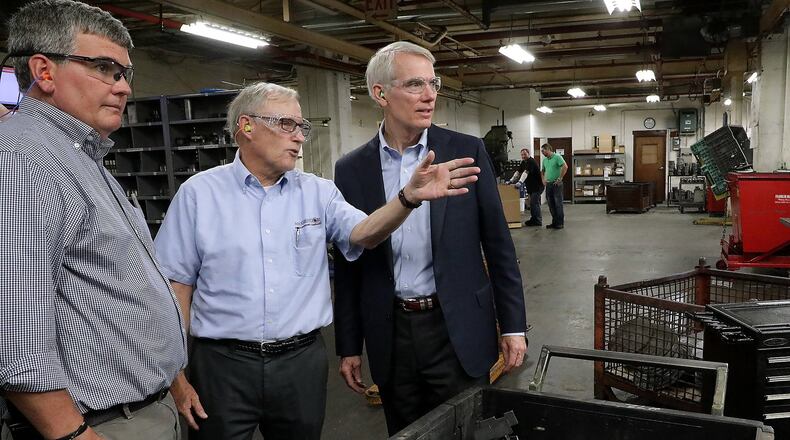The discussion was held at McGregor Metalworking Companies on Tuesday and Sen. Rob. Portman, R-Ohio, attended.
“What’s happened is the economy has picked up but the workforce has not,” he said. “I mentioned earlier that the labor force participation rate, the percentage of people who are actually in the workforce, is at relatively low levels.”
MORE: $8M expansion at New Carlisle plant nears completion
In Springfield the conversation was centered around how education can be used to provide manufacturers with the employees they need. For some participants, they felt there needed to be an emphasis on soft skills training as they are experiencing high employee turnover.
Ross McGregor —a former state representative and executive vice president of Pentaflex, an auto parts maker in Springfield— said it usually takes 30 to 60 days to train an employee to a proficient level for entry level manufacturing jobs. He said manufacturers are taking a gamble if potential employees do not have basic soft skills or a desire to stay with the company.
“It’s almost a risk anymore to take the time to invest in an individual until they have proven that they actually want to be a part of it,” he said.
State Rep. Kyle Koehler, R-Springfield, who is also a part owner of K.K. Tool Co. in Springfield, said his company is having trouble keeping new hires on board for more than three weeks.
Koehler said his company focuses on turning workers into tool and dye makers and in order to do that, those employees must have good soft skills. He said that includes showing up to work on time and understanding the importance of working with others.
Some companies have incorporated lessons regarding soft skills into in-house training sessions.
McGregor Metalworking rolled out a new program in the beginning of June that uses training sessions from the Precision Metalforming Association.
“It is the only way to do it at this point. We have been looking for years to have someone come off the street with the skills that we need. It is just not out there,”said Kara Williams, Director of Human Resources at McGregor Metalworking Companies.
Though the training focuses primarily on skills needed to operate equipment on the manufacturing floor some sessions include lessons focusing on leadership qualities.
“In the end of the day you know what that person is capable of. You will have people that will show up and say ‘yeah I got this training’ and you put them out on the floor ‘maybe you don’t have as much training as you thought you did,’”said Koehler.
LOCAL: Urbana to move its finance, human resources departments
“If you train them in-house then you know who you are dealing with,” he added.
However, local manufacturers have also worked with community colleges such as Clark State to focus on leadership qualities within the manufacturing field.
Jo Alice Blondin, president of Clark State, said they have worked with companies such as McGregor Metalworking to form apprenticeships and the college has created a bachelor’s program centered around manufacturing technology.
She said individuals with supervising skills in the manufacturing sector are reaching retirement age making it important to train the next generation.
“It is going to be next to impossible to replace them if we do not have current pathways for (their replacements) to get those skills,” Blondin said.
Portman said he co-authored bi-partisan legislation such as the JOBS Act in 2017 that aims to make short-term job training programs more affordable by expanding access to Pell Grants. That legislation was included in President Donald Trump’s budget request for the 2020 fiscal year.
“You can use a Pell (grant) to go to college and we are all for that,” Portman said to local business leaders.
“But why should you only get to use Pell for colleges and universities and not get to use it for what is really frankly more needed right now,” he added.
About the Author
